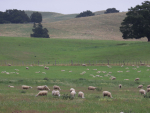December has been the driest month on record for most of Southland with as little as three per cent of the historical rainfall average falling in some parts.
Environment Southland Scientific Officer Chris Jenkins said in what was typically one of Southland's wetter months, the Council's automated rain gauge network has recorded a range of between just three and 33 per cent of the December averages across the region.
That represents some of the lowest levels on Environment Southland's records.
Jenkins said hardest hit by the lack of rainfall have been coastal and central Southland.
Woodlands received just 4.5mm of rain last month, well below the December average of 102mm taken from records dating back to 1975. Invercargill has had 13mm of rainfall, the lowest since 1940.
The Hokonui hills had 8 mm which is the lowest since records began in 1963.
River levels are dropping but they have not yet reflected the December dry spell because the wet spring season bolstered groundwater levels.
The Oreti, Mataura and Aparima rivers are already below the mean annual low flow and will continue to fall steadily, unless replenished by significant rainfall, Mr Jenkins said.
However river flows are typically at their lowest in February or March as groundwater inputs decrease, he said.


















